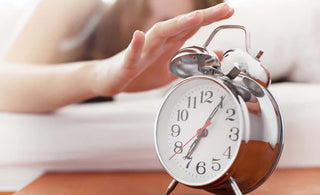
Not getting enough shut-eye? You’ll be surprised at how lack of sleep is affecting your body far more than just the feeling of tiredness. See the damage it could be doing to you.
Sleep is an essential part of ensuring our health and well-being, this we have been taught from a young age. We have all felt the effects of not getting enough, ranging from struggling to wake up at your usual time, to feeling more lethargic throughout the day. However, some of the effects from not meeting the recommended eight hours a night might shock you. Here we list some surprising results from under sleeping.
Not getting enough sleep can contribute to weight gain!
Studies suggest poor sleep is linked to gaining weight[i]. Research has shown, people who are sleep deprived are likely to eat more throughout the day and succumb to snacking on high calorie food[ii]. There is also evidence suggesting a lack of sleep contributes to a slower metabolism. In addition, often when we are tired we resort to fatty foods or easy-to-make meals. Keeping a high-nutrient diet is key to staying healthy. A simple way to keep vitamins, protein, minerals and other vital nutrients in your diet is to use the Vital All-In-One total health supplement daily. Taking a minute out of your busy day to add two teaspoons to water is all it takes. Ultimately, on top of a healthy diet, getting enough sleep throughout the week is key to weight maintenance!
Poor sleep could contribute to having an accident!
Poor quality sleep has been linked to increased likelihood of accidents and injuries at work. When people do not get enough sleep throughout the night, they are fatigued the next day and their reflexes & judgement are lowered. Sleep loss is also linked to likelihood of car crashes. Estimates suggest up to 7,500 fatal motor crashes occur every year in the United States because of drowsy driving.[iii]!
Not getting enough sleep may contribute to increased signs of ageing
Another surprising result from sleep deprivation is it can result in dry skin. This is because the skin becomes inflamed with a lack of sleep and causes skin-barrier dysfunction, which causes your skin to dry out and flake. If feeling lethargic isn’t bad enough, your face will show if you are sleep deprived. There is no better moisturiser than a good night’s sleep!
Lack of sleep is linked to increased risk of having a stroke.
Aside from the acute responses in your body, not getting enough sleep has even been linked to increased stroke and cardiovascular disease risk. Research has indicated a lack of adequate time asleep and more importantly the quality of sleep, individuals are having can have a direct effect on their risk of heart disease and stroke[iv].
If feeling energized throughout the day was not enough motivation to catch up on your ZZZ’s, hopefully these surprising effects of sleep deprivation will convince you that sleep is vital to living a happy and healthy life!
https://www.healthline.com/nutrition/10-reasons-why-good-sleep-is-important#section2
[i] Sanjay R. Patel, Atul Malhotra, David P. White, Daniel J. Gottlieb, Frank B. Hu 2007, ‘Association between Reduced Sleep and Weight Gain in Women’, American Journal of Epidemiology, Vol 164. No 10, Pp. 947–954.
[ii] Sanjay R. Patel, Atul Malhotra, David P. White, Daniel J. Gottlieb, Frank B. Hu 2007, ‘Association between Reduced Sleep and Weight Gain in Women’, American Journal of Epidemiology, Vol 164. No 10, Pp. 947–954.
[iii] Klauer SG, Dingus TA, Neale VL, Sudweeks JD, Ramsey DJ 2006, ‘The impact of driver inattention on near-crash/crash risk: an analysis using the 100Car Naturalistic Study Data 2006’. Report no. DOT HS 810 594. Washington, DC: US Department of Transportation, National Highway Traffic Safety Administration..
[iv] Francesco P. Cappuccio, Daniel Cooper, Lanfranco D’Elia, Pasquale Strazzullo, Michelle A. Miller 2001, ‘Sleep duration predicts cardiovascular outcomes: a systematic review and meta-analysis of prospective studies’, European Heart Journal, Vol 32. No 12. Pp. 1484–1492.
